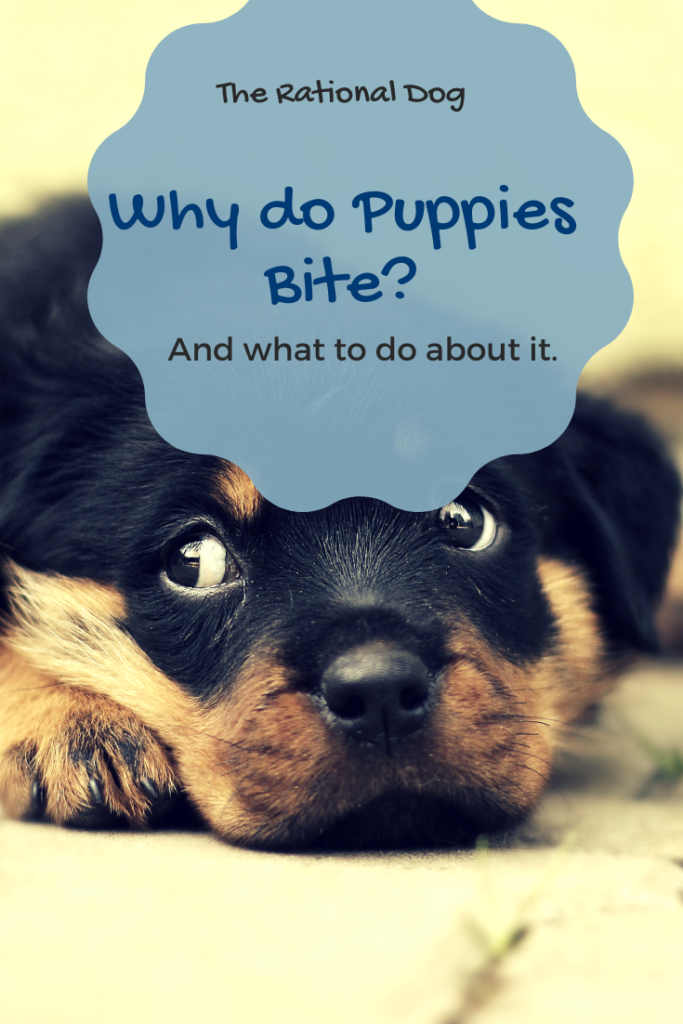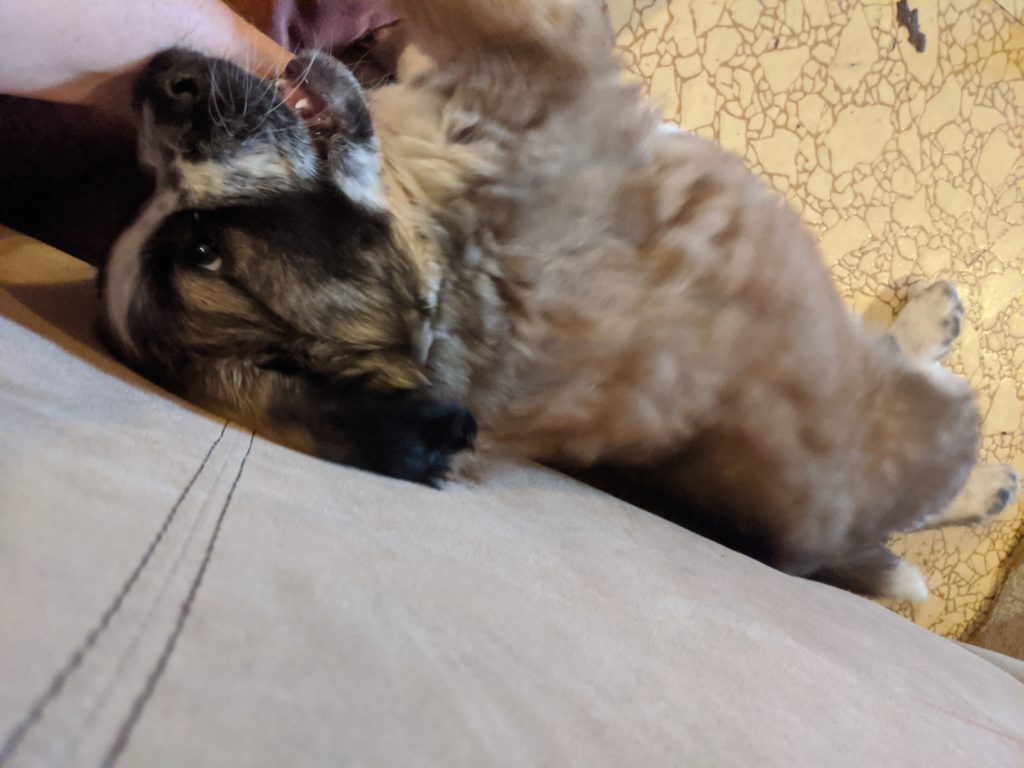Puppies! Nothing calls out to the inner awwww-factory than a sweet little baby dog face. They are fluffy, they are adorable, and they are snuggly as well. However, there’s a side to the little cuddle bugs that people often don’t realize when they bring their puppies home, and that’s the razor sharp alligator teeth side of them. One of the most common issues that I face as a dog trainer is helping folks curb the natural biting tendency of puppies. In order to do that, it’s important to understand why puppies bite in the first place. Then, once that’s addressed, we can take a look at what to do to get that painful and annoying behavior under control.

Puppies bite to play.
When puppies are with their littermates and their mothers, biting is how they play. They don’t have hands, so all of the tumbling, wrestling, and romping involves their little needle sharp teeth. They like to grab and shake each other by the scruff, chomp on a nearby leg or tail, or tug on each others’ ears. The thing that is the biggest difference between playing with a sibling and playing with you and your family is the all-important fur and skin. When puppies play with each other, they have fur and thick, loose skin that has to be penetrated before those teeth can cause any damage. For humans, though, we just have plain old skin, which makes biting a painful and unacceptable form of play.
Puppies may lack bite inhibition.
While they are playing with each other or with their mothers, puppies naturally learn about bite inhibition. When a chomp lands in the wrong place, is too hard, or otherwise is inappropriate for play, the other puppy or dog will correct that bite. A yip and returned bite, being grabbed and pinned down, or a firm growl and bite to the muzzle are all ways that dogs communicate to each other that a bite was unwelcome and not all in good fun.
Particularly when a puppy is separated from his litter mates or mother too early (I recommend waiting until your pup is at least 8 weeks old to bring him home!), they miss out on these crucial weeks of teaching opportunities and learning moments. Puppies that are re-homed at 5-6 weeks very often have trouble knowing how hard is too hard, and when to quit even after you have corrected them for biting. You have to do the extra work to teach them the things that they naturally learn with their litter mates and other dogs.
Want to learn more about training your puppy? Check out our NEW puppy training course to get that biting under control!
Puppies may be over-stimulated.
One thing that people often don’t realize, or take into account, is the developmental age of a puppy when compared to a human. In general, it’s safe to say up until about 6 months that however many months old your puppy is, you can compare him to a child of that many years. For example, a two month old puppy has many of the same traits as a two year old human. A three month old puppy, a three year old human. At about six months, puppies tend to have a big jump forward into adolescence, while humans take another six years or so to catch up. However, since we are talking about young puppies, this applies.
An 8 week old puppy (or 2 months old) tends to show many of the same developmental traits as a two year old child. A toddler. Very forward and social, eager and excited to learn new things, and completely enveloped in a world of play! They are so much fun! But, just like toddlers, young puppies fall prey to that age old enemy of parents…over-stimulation. Just as a young child gets cranky and has tantrums and meltdowns, so can your puppy. These tantrums often involve incessant chewing on your hands and inappropriate biting that will not be redirected. Often the best choice when this happens is to put your puppy in his crate, his bed, or wherever his sleeping area is, and to let him wind down and rest by himself.

How to teach your puppy to stop biting.
Now that we understand some reasons behind your puppy’s biting habit, it’s time to address the behavior and put a stop to it. Puppies may bite because they’re being playful, but that doesn’t mean it doesn’t hurt, just like when a toddler throws a wooden block at your head. There are three simple steps to stopping your puppy’s biting: Stop, Correct, and Redirect.
Stop and correct the behavior.
When your puppy is biting your hands, ankles, or legs, don’t let them continue to do it! Stop that behavior. Rather than gritting your teeth against the pain while you wrestle, make your pup stop the biting. You can take him by his collar, the scruff of his neck, or the loose skin on the side of his face and firmly tell him “No!” just as another dog would do. You shouldn’t hurt your puppy when doing this, but you should be firm enough that he stops biting and looks up at your face for direction on what to do.
Redirect the behavior.
Once he’s stopped and knows you’re serious about things, you can continue to play, but you’ve got to give him something to do instead of biting you. Giving him a toy to chase or tug to keep his mouth busy will teach him that if he wants to chew or bite, the toy is the right thing to do that with! Give him a chewy bone to keep his mouth busy while you play. Most importantly, from the very beginning it’s important to start to implement games of self control and respect! You can learn a little bit more about those games in our Leading Your Dog course, which is a great starting point for families with new puppies!
If your puppy does not stop biting, and he won’t be redirected to another activity, consider that he may be tired or overstimulated. Just as a toddler or young child loses the ability to regulate their playing impulses when they are overly tired, puppies face the same challenge. If that’s the case, rather than continuing to fight with your puppy, gain bruises, and become frustrated, put him in his resting place (crate, bedroom, etc.) for awhile so that he can decompress and rest for awhile before you play again. You’ll find that it helps both of you to enjoy your playtime a little more!